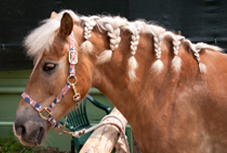
The Mane Challenge
One morning, as I was innocently typing away at my desk, my boss came by, PICKED UP A LOCK OF MY HAIR, and said, "You know...you have SUCH beautiful hair!"

I have set Hashem before me always. (Psalm 16:8)
A couple weeks ago a friend of mine invited a few women over to her house for lunch. It was really just a meal to get together with other like-minded women, but since it would be right after Tisha B’Av and we were all expecting Mashiach any time, we were hoping that it would actually be a wondrous celebration! Alas, even though our yearnings still continue today, it was nonetheless a very special gathering. Some of the ladies I already knew and others I had the pleasure of meeting that day.
During introductions, the conversation somehow turned to the topic of head coverings. It seems that for most women, this is one of the most challenging mitzvot (commandments) to take on. Both for the Ba’alat Teshuva (new to religious observance) and the newly married woman, covering one’s hair is something which just does not come naturally and great efforts are undertaken to fulfill this obligation (the reward, however, is administered accordingly). So if you are still struggling with this issue, there is no need to feel alone. Perhaps the following stories can give some chizuk (strength) to forge forward and realize your goals.
For me personally, it was the last straw on the proverbial camel’s back that pushed me to finally make the decision. I had already accepted Shabbat, Kashrut, and going to the Mikvah but I only wore a hat when I attended shul (synagogue) services. I knew it was important, but I  just wasn’t ready. Then tragedy struck, and as my mother’s life hung in the balance, I committed to fully cover my hair to show my unequivocal loyalty to Hashem and His laws.
just wasn’t ready. Then tragedy struck, and as my mother’s life hung in the balance, I committed to fully cover my hair to show my unequivocal loyalty to Hashem and His laws.
Laurie and her husband were also slowly taking on mitzvot (commandments) and directing their lives toward a Torah lifestyle when HaKadosh Baruch Hu, the Holy One, Blessed be He, gave them a big nudge by blessing their union with a second child at only 25 weeks gestation. Faced with one tribulation after another, the stress stimulated them to add more mitzvot to their lives, many in exchange for beseeching G-d to bring about the healing of their infant son’s many health problems. Then one winter, their son, already weakened by several past infections, fell seriously ill. He was hospitalized with pneumonia and fearing for his life, Laurie made a deal with Hashem that if He would cure her son, she would begin covering her hair. Her son got well, B”H, and she went out and purchased two sheitels (wigs) and some hats.
Several years later, she tried going without a head covering when she visited a dear friend in Florida. After all, she was in a strange place and no one would know her there. She went into a bookstore and suddenly she found herself being introduced to two Chabad Rabbis! She was extremely embarrassed since, though she pretended she didn’t cover her hair, she knew the truth. More importantly, G-d was reminding her that He was by her side, wherever she may be. Returning to her friend’s house, she immediately put on her cap and she has kept her hair covered ever since.
Ellen made a virtuous effort to always cover her hair but like the best of us, she too was enticed by her yetzer hara (evil inclination). She recounted: “One day while on a hike with my husband along the Burma Road in Israel we were enjoying our hike out in the fresh air. Although I had been covering my hair for some time, one of things I missed most was the feel of the wind sweeping through my hair and feeling the cool air on my scalp.
As there was no one else on the trail, I said to my husband how nice it would be to take off my wide-brimmed hat and tichel (headscarf) just once. His immediate response was “No, don’t”.
“Why?” I asked. “I miss that so much.” So I took off my hat, untied my tichel and felt the cool breeze in my hair. Unbeknownst to us, there was a road above us to the left and all of a sudden we heard a car whiz by and people shouting, obviously enjoying themselves. I screamed, my husband laughed and I rushed to put my tichel back on. A moment of joy and terror at the same time; was Hashem speaking to me? You bet.“
Chava’s story was also made in shamayim (heaven), so much so that one can get the chills realizing how our Father in Heaven is constantly prodding us to do what is right, each in his or her own way, at the right time. Chava was 25, newly observant and similarly had been keeping the ‘Big Three’; Shabbat, Kashrut and Taharat HaMishpacha (family purity). She started learning more and more and increasing her mitzvot, but she found covering her hair very difficult.
She tells the tale: “My hair was very long and full, and I loved the freedom of letting it flow in the wind. I had already given up my beautiful blue jeans, embroidered up to the knees with flowers and rainbows….this too?? As a married woman, I realized that it really was incumbent on me to cover my hair as well, but I fought it. If Hashem wanted this from me, I needed some help.
Hashem gave me a direct, but gentle push in the right direction. I worked for a company as a secretary, and my desk was at the entrance to the office. One morning, as I was innocently typing away at my desk, my boss came by, PICKED UP A LOCK OF MY HAIR, and said, “You know……you have SUCH beautiful hair!” I was aghast! Needless to say, I soon started coming in with my hair covered!”
A Jewish woman covers her hair after marriage, safeguarding it for only her husband to see. The laws of Sotah indicate that when a wife’s suspected fidelity is being tested, the priest “shall let the hair of the woman’s head go loose” (Numbers 5:18). The fact that this causes her untold humiliation shows how improper it is to display one’s hair.
The Talmud tells of the righteous Kimchit whose 7 sons all became High Priests. Why did she merit sons in such lofty positions? It was attributed to the fact that she was so humble that she would not even show her hair to the rafters of her house. We may not be able to live up to the level of this tzedkut (righteousness), but we can attempt to emulate some of her attributes, one of them being modesty, in the home and out.
After a fascinating Dvar Torah and a joint recitation of Birkat Hamazon (blessing after meals) we all went back to our own individual daily routines. I felt privileged to have been in the company of such pious women. I left feeling not only inspired, but with a fresh desire to thank the Master of the Universe for every aspect of my life and to continue spreading His Light and Compassion to all my holy sisters, each one of us, His truly precious, beloved daughter.







Tell us what you think!
Thank you for your comment!
It will be published after approval by the Editor.